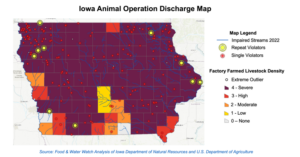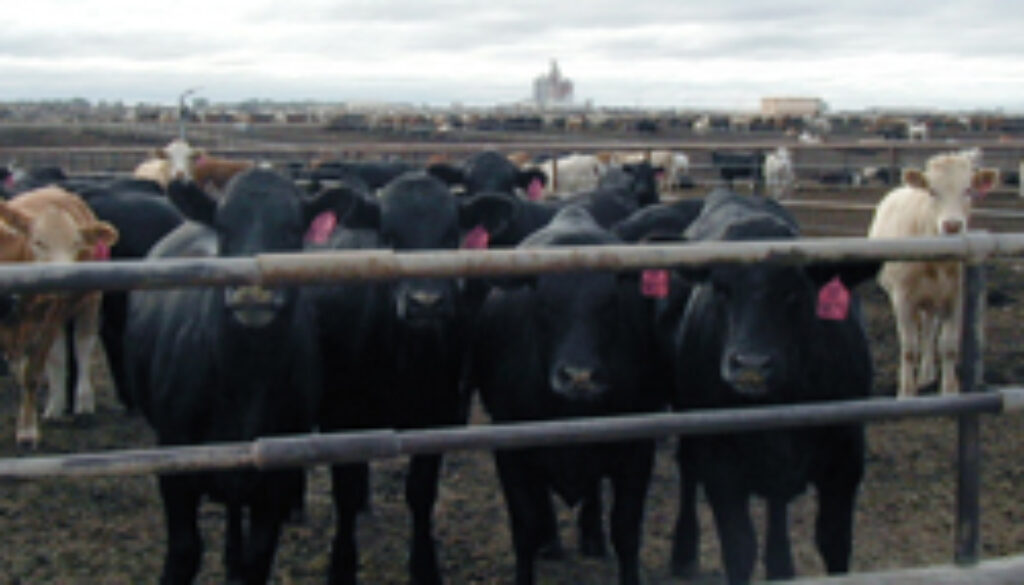Iowa is “in crisis” due to illegal manure discharges into waterways, new report says
Iowa regulators are failing to properly penalize Iowa factory farms for illegally contaminating state waterways with animal waste, according to an analysis released Monday by a public health advocacy group.
Between 2013 and 2023, the Iowa Department of Natural Resources (DNR) recorded 179 incidents in which livestock operators discharged manure in violation of the law, fouling creeks and rivers and killing off more than one million fish, according to Food & Water Watch, which based its report on a review of state discharge enforcement reports. The quantities of discharges ranged up to 1 million gallons, the group said.
The findings show a “state in crisis,” according to the group, which said its analysis found “no area of the state is safe from manure discharging into waterways.”
The group noted the violators have paid less than $750,000 in penalties for the illegal actions, despite the fact that such spills can carry harmful contaminants known to cause birth defects, cancers and other health problems in people.
“While factory farms spur on Iowa’s worsening water pollution crisis, the state is letting corporate giants get off with barely a slap on the wrist,” Food & Water Watch organizer Michaelyn Mankel said in a statement.
The Iowa DNR did not respond to a request for comment.
 The group released an interactive spill map along with its report, which shows spills occurring across the state at hog, dairy cow and beef cattle operations, among others, with a large concentration in the northwest part of Iowa, where the density of concentrated animal feeding operations (CAFOs) ranks among the highest in the nation, Food & Water Watch said.
The group released an interactive spill map along with its report, which shows spills occurring across the state at hog, dairy cow and beef cattle operations, among others, with a large concentration in the northwest part of Iowa, where the density of concentrated animal feeding operations (CAFOs) ranks among the highest in the nation, Food & Water Watch said.
The potential human health impacts of the contamination generated by large animal operations, combined with runoff from crop-growing farm fields where pesticides and fertilizers are applied, including manure used as fertilizer, is a growing concern in Iowa.
The state has more than 700 “impaired” waterways that contain toxins at levels above federal safety thresholds, including drinking water supplies for major cities.
Palo Alto County, in northwest Iowa, has the highest incidence of cancer of any county in the state and the second-highest incidence of cancer among all US counties, according to a 2023 report by US News.
The five-year incidence rate for cancer in Palo Alto County is 658.1, far higher than the national five-year average of 442 new cancer cases reported for every 100,000 people, according to the National Cancer Institute.
The concerns are not limited to Palo Alto County. Iowa has the second-highest and fastest-rising cancer incidence among all US states, according to a 2024 report issued by the Iowa Cancer Registry.
Food & Water Watch and a dozen other organizations are petitioning the Environmental Protection Agency (EPA) to take emergency action on the unsafe conditions under the Safe Drinking Water Act.
In releasing the new report, Food & Water Watch said the 179 illegal discharges likely represent an undercount, since thousands of large “factor farms” lack pollution monitoring.
The group said that Iowa taxpayers pay up to $66 million annually in statewide drinking water cleanup costs “from nitrate contamination stemming from manure spreading and nitrogen fertilizers.”
(Featured photo by Keith Schneider.)
 EWG
EWG


